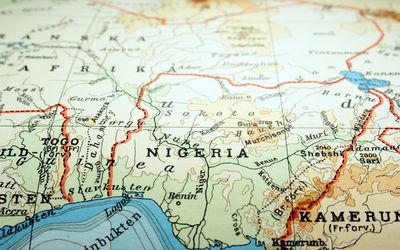Nigeria to become Africa’s biggest economy
by Siya Mnyanda,
2014-01-31 05:33:57.0
WHETHER we like it or not, Nigeria is set to displace South Africa as the continent’s largest economy. Other than the "bragging rights" that come with being top of anything, what does this mean?
In the coming month, Nigeria will finally complete a rebasing of its gross domestic product (GDP) data, which is likely to see Africa’s top oil-producing nation dethrone South Africa and become the continent’s largest economy in terms of its GDP size. In 2012, the World Bank estimated Nigeria’s economic output at $263bn and South Africa’s at $384bn. According to projections by economists, however, this rebasing exercise may see Nigeria’s GDP increase to somewhere between $384bn and $424bn, making it Africa’s new economic powerhouse.
Over the past decade, Nigeria has boasted superior economic growth. The West African nation, with a population of more than 170-million people — three times South Africa’s 51-million — has outpaced South Africa’s sluggish growth by expanding by an average of 7% a year, compared with South Africa’s meagre 3% average.
In all likelihood, rebasing will result in Nigeria being regarded as Africa’s largest economy, but will this have any effect on the average Nigerian? Many economists have argued that this new position will have little effect on the estimated 100-million people living in Nigeria who survive on less than $1 a day. Another worry that economists have is Nigeria’s single-commodity dependence; oil accounts for almost 80% of the Nigerian government’s revenue at present.
Having a bigger economy does not always mean a country is better off than one with a smaller economy. Countries with larger populations often have bigger economies owing to the fact that there are more people. One cannot simply infer that this means that there is a more developed economy or even that living standards are better. Take China and the US, for example. The Chinese economy has been robust and growing exponentially for the past 30 years, often recording double-digit economic growth and rapidly catching up with the US economy. However, the living standards of the people of China cannot be argued to compare to those of the US. The Chinese population of 1.3-billion people is more than four times that of the US; it is likely that GDP per capita, which can loosely be understood as the money in the economy divided by the number of people in that economy, in the two countries will be comparable only when the Chinese economy is much larger than the US.
Can a similar comparison be made between Nigeria and South Africa? Yes. One in five Africans is Nigerian. By virtue of having the largest population, Nigeria should have the biggest economy on the continent. This is not to say that it is the most advanced economy on the continent. Even if the Nigerian economy is declared the largest in Africa, its GDP per capita is expected to be about $2,400, whereas South Africa’s is almost $7,000.
Much like China and the US, the Nigerian economy would have to be much larger for living standards to be comparable with those in South Africa.
It will be very interesting to see where investors looking to tap into the African market are going to invest after the rebasing. One might guess that they would go for the biggest player first, which is likely to be Nigeria. However, one must still remember that the South African economy will remain more diversified and developed than that of Nigeria for some time to come. South African financial markets rank among the world’s most advanced; the JSE has a total market capitalisation of $903bn, compared with the Nigerian Stock Exchange’s total market capitalisation of $81bn.
South Africa also has world-class infrastructure and superior services industries that make it far easier to do business with South Africa than Nigeria. On the flip side, the South African market is often described as "saturated" and its underwhelming growth and frequent labour unrest often increase the appeal of other emerging African markets, such as Nigeria.
For too long, South Africans have taken their leading economic position on the continent for granted.
It will be good to have a newcomer that threatens to change the traditional route for foreign direct investment into Africa. Nigeria’s new position might also have interesting geopolitical implications, which will not only question South Africa’s place in the Brics (Brazil, Russia, India, China, South Africa) group of powerful emerging economies, but also its sole African representation in the Group of 20.
• Mnyanda is a philosophy and politics major at the University of Cape Town.

Picture: THINKSTOCK
WHETHER we like it or not, Nigeria is set to displace South Africa as the continent’s largest economy. Other than the "bragging rights" that come with being top of anything, what does this mean?
In the coming month, Nigeria will finally complete a rebasing of its gross domestic product (GDP) data, which is likely to see Africa’s top oil-producing nation dethrone South Africa and become the continent’s largest economy in terms of its GDP size. In 2012, the World Bank estimated Nigeria’s economic output at $263bn and South Africa’s at $384bn. According to projections by economists, however, this rebasing exercise may see Nigeria’s GDP increase to somewhere between $384bn and $424bn, making it Africa’s new economic powerhouse.
Over the past decade, Nigeria has boasted superior economic growth. The West African nation, with a population of more than 170-million people — three times South Africa’s 51-million — has outpaced South Africa’s sluggish growth by expanding by an average of 7% a year, compared with South Africa’s meagre 3% average.
In all likelihood, rebasing will result in Nigeria being regarded as Africa’s largest economy, but will this have any effect on the average Nigerian? Many economists have argued that this new position will have little effect on the estimated 100-million people living in Nigeria who survive on less than $1 a day. Another worry that economists have is Nigeria’s single-commodity dependence; oil accounts for almost 80% of the Nigerian government’s revenue at present.
Having a bigger economy does not always mean a country is better off than one with a smaller economy. Countries with larger populations often have bigger economies owing to the fact that there are more people. One cannot simply infer that this means that there is a more developed economy or even that living standards are better. Take China and the US, for example. The Chinese economy has been robust and growing exponentially for the past 30 years, often recording double-digit economic growth and rapidly catching up with the US economy. However, the living standards of the people of China cannot be argued to compare to those of the US. The Chinese population of 1.3-billion people is more than four times that of the US; it is likely that GDP per capita, which can loosely be understood as the money in the economy divided by the number of people in that economy, in the two countries will be comparable only when the Chinese economy is much larger than the US.
Can a similar comparison be made between Nigeria and South Africa? Yes. One in five Africans is Nigerian. By virtue of having the largest population, Nigeria should have the biggest economy on the continent. This is not to say that it is the most advanced economy on the continent. Even if the Nigerian economy is declared the largest in Africa, its GDP per capita is expected to be about $2,400, whereas South Africa’s is almost $7,000.
Much like China and the US, the Nigerian economy would have to be much larger for living standards to be comparable with those in South Africa.
It will be very interesting to see where investors looking to tap into the African market are going to invest after the rebasing. One might guess that they would go for the biggest player first, which is likely to be Nigeria. However, one must still remember that the South African economy will remain more diversified and developed than that of Nigeria for some time to come. South African financial markets rank among the world’s most advanced; the JSE has a total market capitalisation of $903bn, compared with the Nigerian Stock Exchange’s total market capitalisation of $81bn.
South Africa also has world-class infrastructure and superior services industries that make it far easier to do business with South Africa than Nigeria. On the flip side, the South African market is often described as "saturated" and its underwhelming growth and frequent labour unrest often increase the appeal of other emerging African markets, such as Nigeria.
For too long, South Africans have taken their leading economic position on the continent for granted.
It will be good to have a newcomer that threatens to change the traditional route for foreign direct investment into Africa. Nigeria’s new position might also have interesting geopolitical implications, which will not only question South Africa’s place in the Brics (Brazil, Russia, India, China, South Africa) group of powerful emerging economies, but also its sole African representation in the Group of 20.
• Mnyanda is a philosophy and politics major at the University of Cape Town.























Change: -0.47%
Change: -0.57%
Change: -1.76%
Change: -0.34%
Change: 0.02%
Data supplied by Profile Data
Change: -1.49%
Change: 0.00%
Change: -0.47%
Change: 0.00%
Change: -0.08%
Data supplied by Profile Data
Change: 0.48%
Change: 0.91%
Change: 0.38%
Change: -0.15%
Change: 1.05%
Data supplied by Profile Data
Change: 0.25%
Change: -0.21%
Change: 0.33%
Change: -1.22%
Change: -1.21%
Data supplied by Profile Data